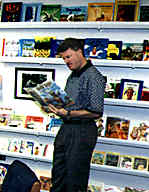by AJ
Looks like Ill be attending the California TESOL conference in San Francisco this year. The conference runs from April 6-9th.
Some of the sessions I hope to attend include:
USING FILM IN AN EFL/ESL SPEAKING AND LISTENING CLASSROOM
Sy Salerian, USF
TEACHING CRITICAL THINKING CULTURE AND ADVANCED LANGUAGE WITH
MOVIES
Angel Chan, Biola University
REAL-WORLD PERSPECTIVES FOR BUSINESS ENGLISH STUDENTS
Ann Campsey, Studies in American Language SJSU
Cassie Piotrowski, Studies in American Language SJSU
INTEGRATING ON-LINE CHATTING FOR OPTIMAL FOREIGN LANGUAGE ORAL
PROFICIENCY
Carolyne Crolotte, University of California, Davis
LIVE ACTION ENGLISH—HIGHLY EFFECTIVE ALL-TIME FAVORITE
Elizabeth Kuizenga Romijn,
COMMUNICATE WITH AUTHENTIC MATERIALS!
Catherine Nameth, Soka University of America
"ACTING" LIKE A TEACHER
Camille Hoffman, Elisa Shore - City College of San Francisco
INTERNET FAIR
Marian Thacher
IT’S 9:00A.M. DO YOU KNOW WHERE YOUR STUDENTS ARE?
Lori Cheeves, New Haven Adult School
LIGHTS! CAMERA! ACTION!
Anne Siebert, Cleveland Adult Education
LIVE ACTION ENGLISH INTERACTIVE—TPR ON A COMPUTER
Larry Statan , Elizabeth Hanson-Smith, Elizabeth Kuizenga Romijn,
HMM. A PROJECT? THAT COULD WORK.
Don Curtis, Oakland Adult Education
Gaylynne Hudson, Oakland Adult Education
Tom Kennedy, San Francisco Unified School District
LEARNER PERSISTENCE-WHAT KEEPS STUDENTS COMING BACK?
Ronna Magy, J. Quinn Harmon-Kelley - LAUSD
SPY ON YOURSELF: TAKING PRONUNCIATION OUTSIDE THE CLASSROOM
Shoshana Bianchi, ECIW - Mills College and College of San Mateo
Demonstration
EXPERIENTIAL LEARNING THROUGH REALITY ENGLISH
Barbara Jonckheere, American Language Institute, California
State University, Long Beach
THE ROAD TO INTERNATIONAL COMMUNITY AT A PRIVATE IEP
Patricia Kilroe, EF International School
DIGITAL MOVIE PROJECTS IN THE ADULT ESL CLASSROOM
Kathleen Slattery, Alan McEwen - Salinas Adult School
STORYTELLING, ROLE PLAYING, CARD GAMES, AND FUN
Raymond Clark, Pro Lingua Associates
HOUSING NEEDS: FINDING SOLUTIONS FOR IEP STUDENTS
Sarah Walsh, Studies in American Language/SJSU
STARTING YOUR OWN WORKPLACE ESL BUSINESS
Ronna Timpa, Workplace ESL Solutions
IT’S SHOWTIME! USING DRAMA TECHNIQUES IN THE ESL CLASSROOM
Kira Burns, Wanvisa Wattanadumrong - San Francisco State
University
VOLUNTEERS IN THE CLASSROOM: TIPS TECHNIQUES; AND RESOURCES
Sarah Gitter, Santa Clara Adult Education
Susan Bremond, Metropolitan Adult Education Program
Patrice Tardif, Director of Programs, Hands On Bay Area;
ENGLISH LANGUAGE DEVELOPMENT FOR ADULT BEGINNERS THROUGH THE
VIGEST APPROACH (Visuals & Gestures)
Chau Nguyen, City College of San Franciso
San Francisco, CA







